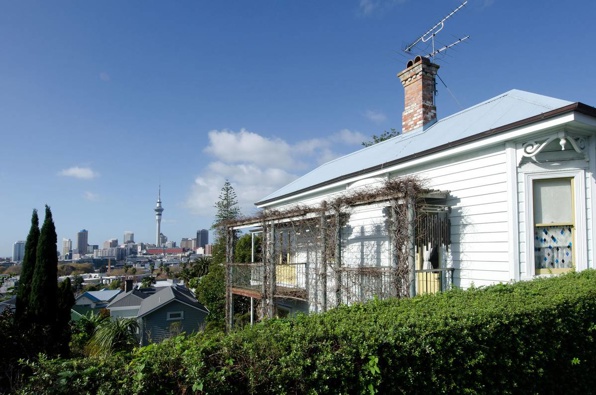The housing market is bucking the trend, according to the Real Estate Institute of New Zealand.
While prices and volumes usually pause in the lead up to an election year, the nation and Auckland saw record volumes and prices this September.
Chief executive Bindi Norwell said: "Normally one month out from an election, people start to take a wait-and-see approach and sales volumes begin easing off."
She cited three factors: record-low interest rates, consumers having additional cash available because they can't go overseas and an uplift in the market from returning ex-pats.
She pointed to the 53 per cent rise in Auckland house sales during September "the highest in 52 months and the highest annual increase in sales volumes in 11 years".
"The number of residential properties sold in September across New Zealand increased by 37.1 per cent from the same time last year, from 6112 to 8377 – the highest number of properties sold in a month in New Zealand for 42 months since March 2017 and the highest number of properties sold in a September month for 14 years," REINZ said.
The REINZ House Price Index for New Zealand, which measures the changing value of property in the market, increased 11.1 per cent annually to 3145, a new high and the first time the index for New Zealand has gone over the 3100 mark.
The HPI for New Zealand excluding Auckland increased by 10.9 per cent from September last year to 3105, a new high.
Auckland's HPI increased 11.4 per cent year-on-year to 3194 also a new high on the index.
Norwell said the market "appears to continue in its trend of being an anomaly, with the number of properties sold the highest in 42 months, since March 2017, when the country was last experiencing such growth".
"Highlighting just how much sales volumes around the country continue to defy expectations, 13 regions had annual sales volumes increases in excess of 20 per cent and 10 regions had increases in excess of 30 per cent - the highest number of regions with this level of sales volume increase since April 2015."
"When you then add in high levels of confidence in the housing market, the removal of the LVRs back in March and people's fear that prices are just going to keep increasing in the future, then this explains why people are going to such lengths to secure a property now," she said.
National median house prices rose 14.7 per cent annually from $675,000 to $685,000 last month.
Auckland's median rose 12.6 per cent from $848,000 to $955,000, which is a new record high, and up from $949,500 in August.
The median number of days to sell nationally decreased by four days from 36 to 32, the lowest since March this year. It took vendors three fewer days to sell in September, from 39 days a year ago to 36 days then, the lowest in a September month in four years.
Gisborne prices rose 45.8 per cent annually, from $384,000 a year ago to $560,000 last month.
Taranaki prices are up 21.3 per cent, from $400,000 in September to $485,000 last month.
Otago saw a 20.7 per cent rise from $489,000 to $590,000.
Bay of Plenty sales prices rose 17.8 per cent from $602,000 to $709,000 and last month was the first time the median went over the $700,000 mark.
Manawatu/Wanganui prices are up 16.6 per cent from $397,000 to $463,000 and Whanganui District had a record median price of $400,000.
Wellington prices were up 13.1 per cent from $650,000 to $735,000 and Lower Hutt City ($702,000), Upper Hutt City ($710,000), Wellington City ($862,000) and Kapiti Coast District ($704,400) had record median prices.
Waikato sales prices rose 14.4 per cent annually, from $555,000 to $635,000, and Hamilton City ($676,000) and Taupō District ($630,000) had record median prices.
Canterbury prices were up 11.1 per cent from $450,000 to $500,000. Christchurch City ($503,000), Kaikōura District ($595,000) and Timaru District ($392,000) also had record median prices.
Mike Jones, ASB senior economist, said the data confirmed what was already becoming abundantly clear: "the New Zealand housing market is going nuts."
The correction, such as it was, appeared to be behind us.
"We have materially upgraded our house price inflation forecasts. The first month of spring ushered in a raft of new records for the housing market," Jones said.
And he doesn't see it stopping.
"The most reliable short-term indicators we monitor point to little prospect of the market slowing down anytime soon. New listings are now rising as prospective vendors are emboldened by frothy conditions. But they're not rising fast enough to keep pace with demand. Sales/listing ratios – an excellent short-term indicator for prices – point to further acceleration in house price inflation from here," Jones said.
Dominick Stephens, Westpac chief economist, said "party like it's 2007. We expect the current strength in the housing market to continue well into next year. The boom is being driven by very low interest rates, and if anything, interest rates are going to fall even further. Other factors like net migration and economic confidence are currently, if anything, holding the housing market back. But by next year, both could be in recovery. When that recovery combines with low interest rates, house prices can be expected to continue rising."
The boom had come as a big surprise to the Reserve Bank, which had been forecasting a 7.7 per cent decline in the six months to September and further falls in the December quarter, Stephens noted.
"The RBNZ is going to have to make a major adjustment to its house price forecast, and therefore to its consumer spending forecast because one reliably influences the other," Stephens concluded.
Take your Radio, Podcasts and Music with you










